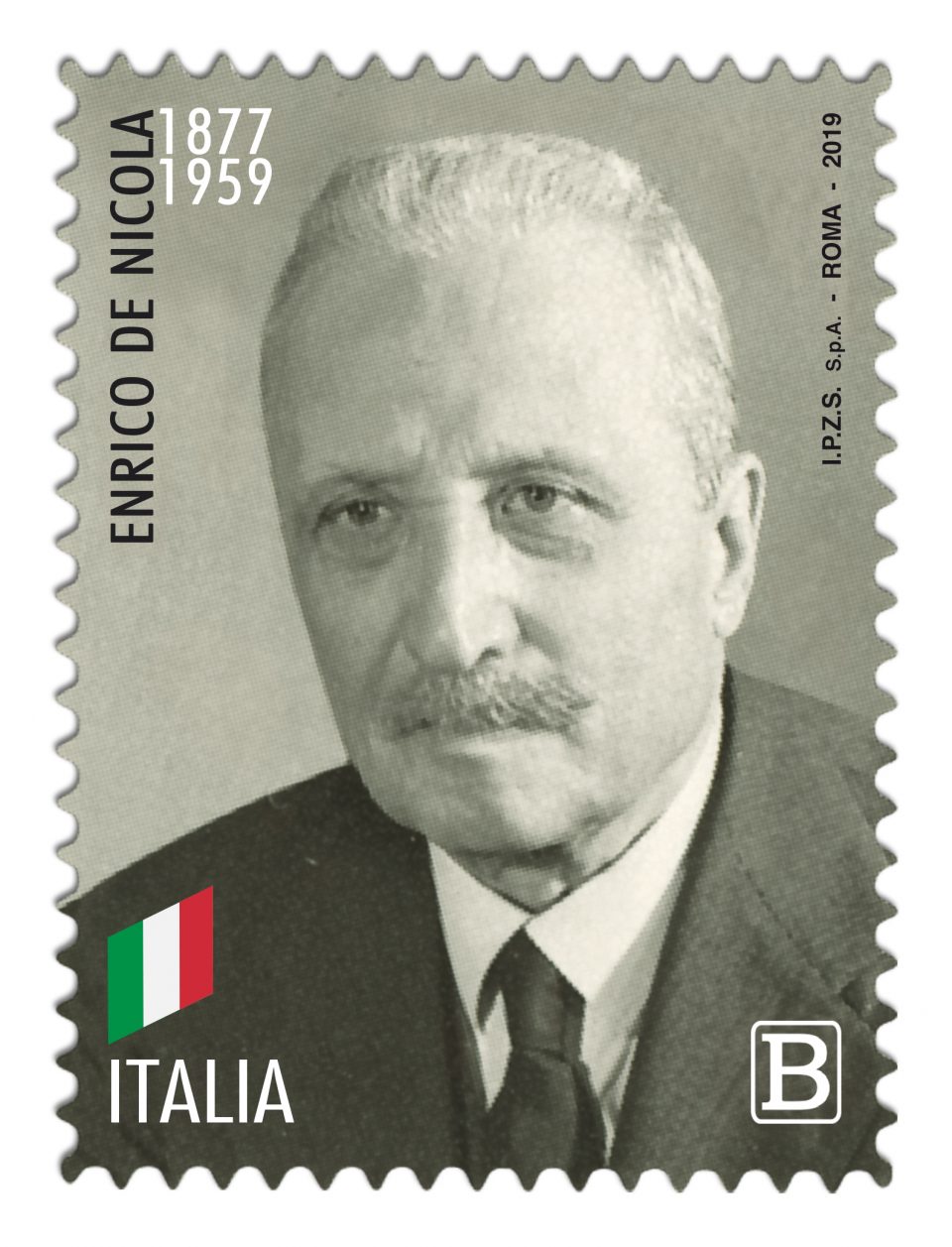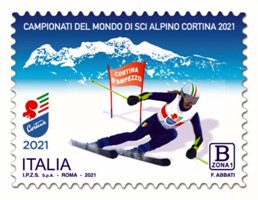POSTE ITALIANE 47^ emissione del 01 Ottobre 2019 di un francobollo commemorativo di Enrico De Nicola, nel 60° anniversario della scomparsa.
POSTE ITALIANE 47^ emissione del 01 Ottobre 2019 di un francobollo commemorativo di Enrico De Nicola, nel 60° anniversario della scomparsa.
Il Ministero dello Sviluppo ha emesso il 1°ottobre 2019 un francobollo commemorativo di Enrico De Nicola, nel 60° anniversario della scomparsa, relativo al valore della tariffa B, corrispondente ad €1.10.

- data / date 01 Ottobre 2019
- dentellatura / serration 11
- stampa / printing fustellatura/rotocalco
- tipo di carta / paper type bianca patinata neutra
- stampato / printed I.P.Z.S. Roma
- tiratura / edition 600.000
- fogli / sheet 45
- dimensioni / dimension 30 x 40 mm
- costo / price B = € 1,10
- bozzettista/ designer per la foto raffigurante Enrico De Nicola: © Archivio Bruni / Gestione Archivio Alinari, Firenze.
- num. catalogo Mi 4144 YT 3905
Enrico De Nicola (Napoli, 9 novembre 1877 – Torre del Greco, 1º ottobre 1959) è stato un politico italiano, primo presidente della Repubblica Italiana. Fu eletto capo provvisorio dello Stato dall’Assemblea Costituente il 28 giugno 1946 e ricoprì tale carica dal 1º luglio dello stesso anno al 31 dicembre 1947. Il 1º gennaio 1948, a norma della prima disposizione transitoria e finale della Costituzione della Repubblica Italiana, esercitò le attribuzioni e assunse il titolo di Presidente della Repubblica Italiana, mantenendoli fino al successivo 12 maggio.
Da presidente della Repubblica Italiana conferì l’incarico ad un solo presidente del Consiglio, Alcide De Gasperi. Data la brevità del suo mandato, non nominò alcun senatore a vita.
De Nicola ricoprì, inoltre, numerosi altri incarichi pubblici: in particolare, è l’unico ad aver ricoperto sia la carica di presidente del Senato della Repubblica sia quella di presidente della Camera dei deputati. Nella sua vita è stato anche il primo presidente della Corte costituzionale, trovandosi così ad aver ricoperto quattro delle cinque maggiori cariche dello stato.
Biografia
Giovinezza e formazione culturale
De Nicola nasce a Napoli da Angelo e Concetta Capranica. Dopo aver compiuto gli studi secondari al liceo classico Antonio Genovesi, si laurea in giurisprudenza nel 1896 presso l’Università degli Studi di Napoli e diviene ben presto avvocato penalista di notorietà nazionale; è anche redattore del quotidiano Don Marzio.
I primi anni in politica
Politicamente di area liberale giolittiana, De Nicola ha la sua prima esperienza amministrativa nel Consiglio comunale di Napoli (1907). Nel1909 è eletto per la prima volta deputato, nel collegio di Afragola, per la XXIII legislatura e, quindi, confermato nelle elezioni politiche del 1913 (XXIV legislatura). Ricopre, per brevi periodi, incarichi di governo: è due volte sottosegretario di Stato, al Ministero delle Colonie nel governo Giolitti IV (1913-1914) e al Ministero del Tesoro nel governo Orlando (1919).
Alle elezioni del 1919 è capolista del Partito Democratico Costituzionale e viene eletto nel collegio di Napoli. Il 26 giugno 1920 è eletto Presidente della Camera dei deputati, a seguito delle dimissioni di Vittorio Emanuele Orlando. In qualità di presidente della giunta elettorale, promuove la riforma dei regolamenti, con l’inserimento del sistema delle commissioni permanenti (fissate in numero di nove) e la disciplina dei gruppi parlamentari.
È rieletto nel 1921 e confermato alla Presidenza della Camera. Nel giugno dello stesso anno, è indicato da Giolitti, insieme a Ivanoe Bonomi, per la formazione del nuovo governo che avrebbe dovuto succedergli, ma preferì rinunciare. Il 3 agosto 1921, è scelto come garante di un “patto di pacificazione” tra socialisti e fascisti, firmato nel suo ufficio di Presidenza ma poi abortito.
Anche con la crisi del Governo Bonomi (febbraio 1922), De Nicola è in predicato per la Presidenza del Consiglio, che poi è assunta da Luigi Facta.
Il periodo fascista e la crisi istituzionale
Dopo l’incarico di formare il governo, conferito a Mussolini, il 31 ottobre 1922 De Nicola si ritrova a presiedere la Camera il giorno del discorso di insediamento, detto “del bivacco”. Appoggia, quale misura eccezionale, la riforma elettorale nota come “legge Acerbo” (novembre 1923) e mantiene la presidenza della Camera fino al conseguente scioglimento della stessa (25 gennaio 1924).
Alle elezioni politiche del maggio 1924, accetta di candidarsi a Napoli nel listone fascista, ma sebbene rieletto nelle votazioni che decretano la vittoria del fascismo, decide di non prestare giuramento e la sua elezione non viene convalidata. Si ritira quindi dalla vita politica e riprende a tempo pieno l’attività professionale.
Nel 1929 è però nominato dal Re senatore del Regno su proposta dell’alto commissario di Napoli, ma non prende mai parte ai lavori assembleari, se non ad alcune commissioni giuridiche. Lo stesso anno, in pieno regime fascista, Ciaramella, podestà di Afragola, che era stata il suo primo collegio elettorale, ottiene dall’alto commissario per la provincia di Napoli l’autorizzazione a intitolargli una strada pur essendo ancora in vita. Alla cerimonia inaugurale interviene anche l’interessato, al quale viene conferita la cittadinanza onoraria.
Negli anni trenta, ebbe come collaboratori, nel suo studio legale, il futuro Presidente della Repubblica Giovanni Leone, nonché l’azionista, poi leader socialista, Francesco De Martino.
Dopo l’armistizio di Cassibile e il trasferimento a Brindisi di Vittorio Emanuele III, s’incontrò con Benedetto Croce e Carlo Sforza per trovare una soluzione finalizzata alla formazione di un governo politico non responsabile verso l’attuale sovrano, troppo compromesso con il regime fascista e al superamento della crisi istituzionale. De Nicola propose di ricorrere alla figura del Luogotenente del Regno, da affidare all’erede al trono, il principe Umberto e si assunse la responsabilità di parlarne con il re. L’incontro avvenne a Ravello il 19 febbraio1944 e, dopo un drammatico colloquio, Vittorio Emanuele accettò, a decorrere dalla liberazione di Roma.
Fu chiamato nel 1945 nella Consulta Nazionale presiedendo dal settembre di quell’anno al giugno 1946 la commissione giustizia.
Elezione a Capo provvisorio dello Stato
L’elezione di De Nicola a capo provvisorio dello Stato fu il frutto di un lungo lavoro “diplomatico” fra i vertici dei principali partiti politici, i quali avevano convenuto che si dovesse eleggere un presidente capace di riscuotere il maggior gradimento possibile presso la popolazione affinché il trapasso al nuovo sistema fosse il meno traumatico possibile. Si convenne perciò che dovesse scegliersi un meridionale, a compensazione della provenienza settentrionale della maggioranza dei leader politici e che (stante il risicato – e da parte monarchica contestato – scarto dei risultati del referendum istituzionale) dovesse trattarsi di un monarchico.
Se sei interessato all’acquisto del francobollo lo puoi acquistare al prezzo di € 1,50. Inviami una richiesta alla email: protofilia1@gmail.com
POSTE ITALIANE 47th issue of 01 October 2019 of a commemorative stamp of Enrico De Nicola, on the 60th anniversary of his death.
On 1 October 2019, the Ministry of Development issued a commemorative stamp of Enrico De Nicola, on the 60th anniversary of his death, relating to the value of tariff B, corresponding to € 1.10.

- data / date 01 Ottobre 2019
- dentellatura / serration 11
- stampa / printing fustellatura/rotocalco
- tipo di carta / paper type bianca patinata neutra
- stampato / printed I.P.Z.S. Roma
- tiratura / edition 600.000
- fogli / sheet 45
- dimensioni / dimension 30 x 40 mm
- costo / price B = € 1,10
- bozzettista/ designer per la foto raffigurante Enrico De Nicola: © Archivio Bruni / Gestione Archivio Alinari, Firenze.
- num. catalogo Mi 4144 YT 3905
Enrico De Nicola (Naples, 9 November 1877 – Torre del Greco, 1 October 1959) was an Italian politician, first president of the Italian Republic. He was elected provisional head of the State by the Constituent Assembly on June 28, 1946 and held this office from July 1 of the same year to December 31, 1947. On January 1, 1948, in accordance with the first transitional and final provision of the Constitution of the Italian Republic, he exercised the attributions and assumed the title of President of the Italian Republic, maintaining them until the following 12 May.
As president of the Italian Republic, he appointed only one Prime Minister, Alcide De Gasperi. Given his brief mandate, he did not appoint any senator for life.
De Nicola also held numerous other public offices: in particular, he is the only one to have held both the office of president of the Senate of the Republic and that of president of the Chamber of Deputies. In his life he was also the first president of the Constitutional Court, finding himself to have held four of the five major offices of the state.
Biography
Youth and cultural education
De Nicola was born in Naples from Angelo and Concetta Capranica. After completing his secondary studies at the Antonio Genovesi high school, he graduated in law in 1896 from the University of Naples and soon became a criminal notorious lawyer of national repute; he is also editor of the newspaper Don Marzio.
The first years in politics
Politically of the Giolittian liberal area, De Nicola had his first administrative experience in the Naples City Council (1907). In 1990 he was elected deputy for the first time in the college of Afragola, for the 23rd legislature and, therefore, confirmed in the political elections of 1913 (XXIV legislature). He holds government posts for brief periods: he is twice State Secretary, at the Ministry of the Colonies in the Giolitti IV government (1913-1914) and at the Treasury Ministry in the Orlando government (1919).
In the 1919 elections he was the leader of the Constitutional Democratic Party and was elected to the Naples college. On 26 June 1920 he was elected President of the Chamber of Deputies, following the resignation of Vittorio Emanuele Orlando. As president of the electoral council, he promotes the reform of the regulations, with the inclusion of the permanent commission system (set at nine) and the discipline of the parliamentary groups.
He was re-elected in 1921 and confirmed as President of the Chamber. In June of the same year, it was indicated by Giolitti, together with Ivanoe Bonomi, for the formation of the new government that was to succeed him, but preferred to renounce. On 3 August 1921, he was chosen as the guarantor of a “pact of peace” between socialists and fascists, signed in his office of Presidency but then aborted.
Even with the crisis of the Bonomi government (February 1922), De Nicola is in preaching for the Presidency of the Council, which is then assumed by Luigi Facta.
The fascist period and the institutional crisis
After the task of forming the government, conferred on Mussolini, on October 31, 1922 De Nicola found himself presiding over the Chamber on the day of the inauguration speech, called “del bivacco”. It supports, as an exceptional measure, the electoral reform known as the “Acerbo law” (November 1923) and maintains the presidency of the Chamber until its subsequent dissolution (25 January 1924).
In the political elections of May 1924, he agreed to run for the Fascist list in Naples, but although he was re-elected in the elections that decreed the victory of fascism, he decided not to take an oath and his election was not validated. He then retired from political life and resumed his professional activity full-time.
In 1929, however, he was appointed by the King Senator of the Kingdom on the proposal of the High Commissioner of Naples, but he never took part in the work of the Assembly, except for some legal commissions. The same year, in the full fascist regime, Ciaramella, podestà of Afragola, who had been his first constituency, obtained permission from the high commissioner for the province of Naples to entitle him to a street even though he was still alive. The interested party also takes part in the inaugural ceremony, to whom honorary citizenship is conferred.
In the thirties, he had as his collaborators, in his law firm, the future President of the Republic Giovanni Leone, as well as the shareholder, then socialist leader, Francesco De Martino.
After the Cassibile armistice and the transfer of Vittorio Emanuele III to Brindisi, he met with Benedetto Croce and Carlo Sforza to find a solution aimed at the formation of a political government not responsible to the current sovereign, too compromised with the fascist regime and overcoming the institutional crisis. De Nicola proposed to have recourse to the figure of the Lieutenant of the Kingdom, to be entrusted to the heir to the throne, Prince Umberto and he assumed the responsibility of talking about it with the king. The meeting took place in Ravello on 19 February 1944 and, after a dramatic conversation, Vittorio Emanuele accepted, starting from the liberation of Rome.
He was called in 1945 in the National Council presiding from September of that year to June 1946 the justice commission.
Election as provisional head of state
The election of De Nicola as provisional head of the State was the fruit of a long “diplomatic” work among the leaders of the main political parties, who had agreed that a president should be elected who could receive the greatest possible approval among the population so that the transition to the new system was the least traumatic possible. It was therefore agreed that a southerner should be chosen to compensate for the northern provenance of the majority of political leaders and that (given the limited – and the disputed monarchical side – the result of the institutional referendum) it should be a monarchist.
If you are interested in buying the stamp you can buy it for € 1.50. Send me a request to the email: protofilia1@gmail.com







